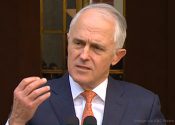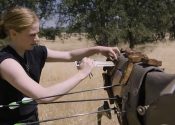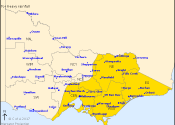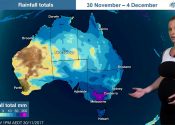
STATE shadow police minister Edward O’Donohue joined Narracan Liberal MP Gary Blackwood in Warragul earlier this month to launch a petition calling for more cops in Gippsland.
Above: Cop out? Shadow police minister Edward O'Donohue speaking to media outside the Warragul Police Station earlier this month. Photo by author.
First published in the 12 June 2015 edition of the Warragul & Baw Baw Citizen.
ADVERTISEMENT
The pair argued issues of abuse of the drug “ice” and domestic violence were stretching police resources and the Labor government was not training enough police.
Asked by the Warragul & Baw Baw Citizen how many additional police the coalition would like to see, Mr O’Donohue said that would be up to the police commissioner.
“The deployment of additional police at individual stations is a matter for the police commissioner, but during our four years in government we funded and the police academy deployed 1,900 additional police,” he said.
“The Police Association prior to the election called for an additional 1,880 during this four years of government. The Labor government has funded just 15,00, which will be deployed to Geelong and the Bellarine.”
Mr O’Donohue said local police needed the resources.
ADVERTISEMENT
“As the shadow police minister, and also a member for the Eastern Victoria region, I’m talking to police all the time and what I’m hearing is they’re under pressure from the challenges of ice and family violence and they need additional resources to deal with that and the population increase that places such as Warragul and Drouin are experiencing.”
The issue of population pressures is not disputed – the region has seen massive growth over the past decade. Also rising rapidly are arrests for drug usage and reports of domestic violence.
In a blog on the Victoria Police website, now-former police chief commissioner Ken Lay argued cultural change for issues of domestic violence was key to fixing the issue and research by the federal Parliamentary Library found medical assistance is more effective than police action in tackling ice.
“Substance-abuse treatment provides a greater return on government investment than does incarceration,” the researches said.
Asked whether calling for preventative measures would be more effective than petitioning for extra cops, Mr O’Donohue said there was need for multiple approaches.
“A multi-faceted approach is required and the Royal Commission into Family Violence will tease out many of those issues,” he said.
“In government we funded 12 community-based projects to tackle the scourge of family violence and to reduce violence against women and children, one here in Gippsland.
“Funding for those projects expires in the coming 12 months.
ADVERTISEMENT
“The Coalition prior to the election had a suite of policies to respond to the issue of ice. The government has in recent months released its Ice Action Plan.
“There’s bipartisan support to tackle the scourge of ice in our communities and we would support anything that helps to tackle that issue.
“We had a number of initiatives prior to the election, one for community-led responses that provided up to $100,000 funding to individual communities.”
When asked if the Coalition should have invested more in preventative measures while in government, Mr O’Donohue said:
“The coalition did put additional funding into those but I suppose we’re looking to the future and the Royal Commission into Family Violence will identify a number of shortfalls in the area of family violence, the government’s issued its ice action plan, there’s bipartisan support for the need to address these issues.”
A report by the federal government’s Australian Institute of Criminology has argued police involvement could be effective in preventing repeat offences, but it “may also reflect proactive behaviour on the part of victims to remove the risk of further violence.
“The primary reason to improve the response of police to family violence is to decrease the frequency and severity of violence experienced by victims and to ensure their safety,” the report said.
“Many domestic and family violence incidents are likely to be perpetrated by the same offender and/or experienced by the same victim and/or occur at the same address.
“That is, it is likely that a substantial proportion of domestic and family violence incidents involve repeat offenders, victims and locations.
“This suggests that placing an intervention focus on repeat offenders and locations may have a greater impact in reducing incidents than treating all incidents in the same manner.”
Mr O’Donohue said that while support agencies needed to be funded, “police need to be resourced to respond.”
“Responding to those issues can be very time-intensive,” he said.
“The Police Association in their submission to the Royal Commission talk about the number of hours it takes to respond to a family violence call-out.”-
Anyone needing help with family violence issues can free call 1800 RESPECT (1800 737 732) or visit 1800respect.org.au for phone or online counselling.





















